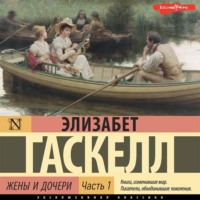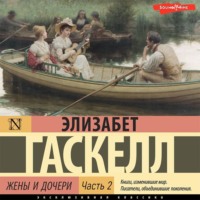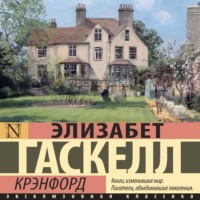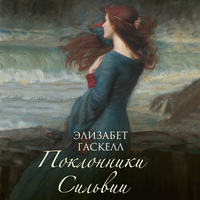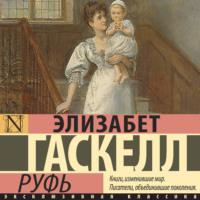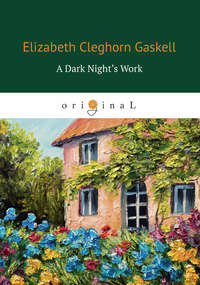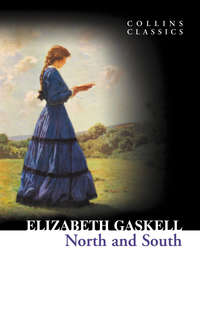
Полная версия
Mary Barton
‘Take that for old acquaintance’ sake, then,’ said the girl, blushing rosy red, more with anger than shame, as she slapped his face. The tones of her voice called back her father and his friend, and the aggressor proved to be the eldest son of the latter, the senior by eighteen years of his little brothers.
‘Here, children, instead o’ kissing and quarrelling, do ye each take a baby, for if Wilson’s arms be like mine they are heartily tired.’
Mary sprang forward to take her father’s charge, with a girl’s fondness for infants, and with some little foresight of the event soon to happen at home; while young Wilson seemed to lose his rough, cubbish nature as he crowed and cooed to his little brother.
‘Twins is a great trial to a poor man, bless ’em,’ said the half-proud, half-weary father, as he bestowed a smacking kiss on the babe ere he parted with it.
* ‘Nesh’; Anglo-Saxon, nesc, tender. ‘It seemeth for love his herte is tendre and neshe.’ – CHAUCER, Court of Love.
* ‘Farrantly’, comely, pleasant-looking. ‘And hir hatir (attire) was wele farand.’ – ROBERT DE BRUNNE.
CHAPTER 2
A Manchester Tea-Party
‘Polly, put the kettle on,
And let’s have tea!
Polly, put the kettle on,
And we’ll all have tea.’
‘Here we are, wife; did’st thou think thou’d lost us?’ quoth hearty-voiced Wilson, as the two women rose and shook themselves in preparation for their homeward walk. Mrs Barton was evidently soothed, if not cheered, by the unburdening of her fears and thoughts to her friend; and her approving look went far to second her husband’s invitation that the whole party should adjourn from Green Heys Fields to tea, at the Bartons’ house. The only faint opposition was raised by Mrs Wilson, on account of the lateness of the hour at which they would probably return, which she feared on her babies’ account.
‘Now, hold your tongue, missis, will you,’ said her husband good-temperedly. ‘Don’t you know them brats never goes to sleep till long past ten? and haven’t you a shawl, under which you can tuck one lad’s head, as safe as a bird’s under its wing? And as for t’other one, I’ll put it in my pocket rather than not stay, now we are this far away from Ancoats.’
‘Or, I can lend you another shawl,’ suggested Mrs Barton.
‘Ay, anything rather than not stay.’
The matter being decided the party proceeded home, through many half-finished streets, all so like one another, that you might have easily been bewildered and lost your way. Not a step, however, did our friends lose; down this entry, cutting off that corner, until they turned out of one of these innumerable streets into a little paved court, having the backs of houses at the end opposite to the opening, and a gutter running through the middle to carry off household slops, washing suds, &c. The women who lived in the court were busy taking in strings of caps, frocks, and various articles of linen, which hung from side to side, dangling so low, that if, our friends had been a few minutes sooner, they would have had to stoop very much, or else the half-wet clothes would have flapped in their faces: but although the evening seemed yet early when they were in the open fields – among the pent-up houses, night, with its mists and its darkness, had already begun to fall.
Many greetings were given and exchanged between the Wilsons and these women, for not long ago they had also dwelt in this court.
Two rude lads, standing at a disorderly looking house-door, exclaimed, as Mary Barton (the daughter) passed, ‘Eh, look! Polly Barton’s getten* a sweetheart.’
Of course this referred to young Wilson, who stole a look to see how Mary took the idea. He saw her assume the air of a young fury, and to his next speech she answered not a word.
Mrs Barton produced the key of the door from her pocket; and on entering the house-place it seemed as if they were in total darkness, except one bright spot, which might be a cat’s eye, or might be, what it was, a red-hot fire, smouldering under a large piece of coal, which John Barton immediately applied himself to break up, and the effect instantly produced was warm and glowing light in every corner of the room. To add to this (although the coarse yellow glare seemed lost in the ruddy glow from the fire), Mrs Barton lighted a dip by sticking it in the fire, and having placed it satisfactorily in a tin candlestick, began to look further about her, on hospitable thoughts intent. The room was tolerably large, and possessed many conveniences. On the right of the door, as you entered, was a longish window, with a broad ledge. On each side of this, hung blue-and-white check curtains, which were now drawn, to shut in the friends met to enjoy themselves. Two geraniums, unpruned and leafy, which stood on the sill, formed a further defence from out-door pryers. In the corner between the window and the fireside was a cupboard, apparently full of plates and dishes, cups and saucers, and some more nondescript articles, for which one would have fancied their possessors could find no use – such as triangular pieces of glass to save carving knives and forks from dirtying tablecloths. However, it was evident Mrs Barton was proud of her crockery and glass, for she left her cupboard door open, with a glance round of satisfaction and pleasure. On the opposite side to the door and window was the staircase, and two doors; one of which (the nearest to the fire) led into a sort of little back kitchen, where dirty work, such as washing up dishes, might be done, and whose shelves served as larder, and pantry, and store-room, and all. The other door, which was considerably lower, opened into the coal-hole – the slanting closet under the stairs; from which, to the fire-place, there was a gay-coloured piece of oil-cloth laid. The place seemed almost crammed with furniture (sure sign of good times among the mills). Beneath the window was a dresser, with three deep drawers. Opposite the fire-place was a table, which I should call a Pembroke, only that it was made of deal, and I cannot tell how far such a name may be applied to such humble material. On it, resting against the wall, was a bright green japanned tea-tray, having a couple of scarlet lovers embracing in the middle. The fire-light danced merrily on this, and really (setting all taste but that of a child’s aside) it gave a richness of colouring to that side of the room. It was in some measure propped up by a crimson tea-caddy, also of japan ware. A round table on one branching leg, ready for use, stood in the corresponding corner to the cupboard; and, if you can picture all this, with a washy, but clean stencilled pattern on the walls, you can form some idea of John Barton’s home.
The tray was soon hoisted down, and before the merry clatter of cups and saucers began, the women disburdened themselves of their out-of-door things, and sent Mary upstairs with them. Then came a long whispering, and chinking of money, to which Mr and Mrs Wilson were too polite to attend; knowing, as they did full well, that it all related to the preparations for hospitality; hospitality that, in their turn, they should have such pleasure in offering. So they tried to be busily occupied with the children, and not to hear Mrs Barton’s directions to Mary.
‘Run, Mary, dear, just round the corner, and get some fresh eggs at Tipping’s (you may get one apiece, that will be fivepence), and see if he has any nice ham cut, that he would let us have a pound of.’
‘Say two pounds, missis, and don’t be stingy,’ chimed in the husband.
‘Well, a pound and a half, Mary. And get it Cumberland ham, for Wilson comes from there-away, and it will have a sort of relish of home with it he’ll like, – and Mary’ (seeing the lassie fain to be off), ‘you must get a pennyworth of milk and a loaf of bread – mind you get it fresh and new – and, and – that’s all, Mary.’
‘No, it’s not all,’ said her husband. ‘Thou must get sixpennyworth of rum, to warm the tea; thou’ll get it at the “Grapes”. And thou just go to Alice Wilson; he says she lives just round the corner, under 14 Barber Street’ (this was addressed to his wife); ‘and tell her to come and take her tea with us; she’ll like to see her brother, I’ll be bound, let alone Jane and the twins.’
‘If she comes she must bring a tea-cup and saucer, for we have but half-a-dozen, and here’s six of us,’ said Mrs Barton.
‘Pooh, pooh, Jem and Mary can drink out of one, surely.’
But Mary secretly determined to take care that Alice brought her tea-cup and saucer, if the alternative was to be her sharing anything with Jem.
Alice Wilson had but just come in. She had been out all day in the fields, gathering wild herbs for drinks and medicine, for in addition to her invaluable qualities as a sick nurse and her worldly occupations as a washerwoman, she added a considerable knowledge of hedge and field simples; and on fine days, when no more profitable occupation offered itself, she used to ramble off into the lanes and meadows as far as her legs could carry her. This evening she had returned loaded with nettles, and her first object was to light a candle and see to hang them up in bunches in every available place in her cellar room. It was the perfection of cleanliness; in one corner stood the modest-looking bed, with a check curtain at the head, the whitewashed wall filling up the place where the corresponding one should have been. The floor was bricked, and scrupulously clean, although so damp that it seemed as if the last washing would never dry up. As the cellar window looked into an area in the street, down which boys might throw stones, it was protected by an outside shutter, and was oddly festooned with all manner of hedge-row, ditch, and field plants, which we are accustomed to call valueless, but which have a powerful effect either for good or for evil, and are consequently much used among the poor. The room was strewed, hung, and darkened with these bunches, which emitted no very fragrant odour in their process of drying. In one corner was a sort of broad hanging shelf, made of old planks, where some old hoards of Alice’s were kept. Her little bit of crockery-ware was ranged on the mantelpiece, where also stood her candlestick and box of matches. A small cupboard contained at the bottom coals, and at the top her bread and basin of oatmeal, her frying-pan, teapot, and a small tin saucepan, which served as a kettle, as well as for cooking the delicate little messes of broth which Alice was sometimes able to manufacture for a sick neighbour.
After her walk she felt chilly and weary, and was busy trying to light her fire with the damp coals, and half-green sticks, when Mary knocked.
‘Come in,’ said Alice, remembering, however, that she had barred the door for the night, and hastening to make it possible for any one to come in.
‘Is that you, Mary Barton?’ exclaimed she, as the light from the candle streamed on the girl’s face. ‘How you are grown since I used to see you at my brother’s! Come in, lass, come in.’
‘Please,’ said Mary, almost breathless, ‘mother says you’re to come to tea, and bring your cup and saucer, for George and Jane Wilson is with us, and the twins, and Jem. And you’re to make haste, please.’
‘I’m sure it’s very neighbourly and kind in your mother, and I’ll come, with many thanks. Stay, Mary, has your mother got any nettles for spring drink? If she hasn’t I’ll take her some.’
‘No, I don’t think she has.’
Mary ran off like a hare to fulfil what, to a girl of thirteen, fond of power, was the more interesting part of her errand – the money-spending part. And well and ably did she perform her business, returning home with a little bottle of rum, and the eggs in one hand, while her other was filled with some excellent red-and-white, smoke-flavoured, Cumberland ham, wrapped up in paper.
She was at home, and frying ham, before Alice had chosen her nettles, put out her candle, locked her door, and walked in a very footsore manner as far as John Barton’s. What an aspect of comfort did his house-place present, after her humble cellar! She did not think of comparing; but for all that she felt the delicious glow of the fire, the bright light that revelled in every corner of the room, the savoury smells, the comfortable sounds of a boiling kettle, and the hissing, frizzling ham. With a little old-fashioned curtsey she shut the door, and replied with a loving heart to the boisterous and surprised greeting of her brother.
And now all preparations being made, the party sat down; Mrs Wilson in the post of honour, the rocking-chair, on the right-hand side of the fire, nursing her baby, while its father, in an opposite arm-chair, tried vainly to quieten the other with bread soaked in milk.
Mrs Barton knew manners too well to do anything but sit at the tea-table and make tea, though in her heart she longed to be able to superintend the frying of the ham, and cast many an anxious look at Mary as she broke the eggs and turned the ham, with a very comfortable portion of confidence in her own culinary powers. Jem stood awkwardly leaning against the dresser, replying rather gruffly to his aunt’s speeches, which gave him, he thought, the air of being a little boy; whereas he considered himself as a young man, and not so very young neither, as in two months he would be eighteen. Barton vibrated between the fire and the tea-table, his only drawback being a fancy that every now and then his wife’s face flushed and contracted as if in pain.
At length the business actually began. Knives and forks, cups and saucers made a noise, but human voices were still, for human beings were hungry and had no time to speak. Alice first broke silence; holding her tea-cup with the manner of one proposing a toast, she said, ‘Here’s to absent friends. Friends may meet, but mountains never.’
It was an unlucky toast or sentiment, as she instantly felt. Every one thought of Esther, the absent Esther; and Mrs Barton put down her food, and could not hide the fast-dropping tears. Alice could have bitten her tongue out.
It was a wet blanket to the evening; for though all had been said and suggested in the fields that could be said or suggested, every one had a wish to say something in the way of comfort to poor Mrs Barton, and a dislike to talk about anything else while her tears fell fast and scalding. So George Wilson, his wife, and children set off early home, not before (in spite of mal-à-propos speeches) they had expressed a wish that such meetings might often take place, and not before John Barton had given his hearty consent; and declared that as soon as ever his wife was well again they would have just such another evening.
‘I will take care not to come and spoil it,’ thought poor Alice, and going up to Mrs Barton, she took her hand almost humbly, and said, ‘You don’t know how sorry I am I said it.’
To her surprise, a surprise that brought tears of joy into her eyes, Mary Barton put her arms round her neck, and kissed the self-reproaching Alice. ‘You didn’t mean any harm, and it was me as was so foolish; only this work about Esther, and not knowing where she is, lies so heavy on my heart. Good-night, and never think no more about it. God bless you, Alice.’
Many and many a time, as Alice reviewed that evening in her after life, did she bless Mary Barton for these kind and thoughtful words. But just then all she could say was, ‘Good-night, Mary, and may God bless you.’
* ‘For he had geten him yet no benefice.’ – Prologue to Canterbury Tales.
CHAPTER 3
John Barton’s Great Trouble
‘But when the morn came dim and sad,
And chill with early showers,
Her quiet eyelids closed – she had
Another morn than ours.’
HOOD
In the middle of that same night a neighbour of the Bartons was roused from her sound, well-earned sleep, by a knocking, which had at first made part of her dream; but starting up, as soon as she became convinced of its reality, she opened the window, and asked who was there?
‘Me – John Barton,’ answered he, in a voice tremulous with agitation. ‘My missis is in labour, and, for the love of God, step in while I run for th’ doctor, for she’s fearful bad.’
While the woman hastily dressed herself, leaving the window still open, she heard the cries of agony, which resounded in the little court in the stillness of the night. In less than five minutes she was standing by Mrs Barton’s bedside, relieving the terrified Mary, who went about where she was told, like an automaton; her eyes tearless, her face calm, though deadly pale, and uttering no sound, except when her teeth chattered for very nervousness.
The cries grew worse.
The doctor was very long in hearing the repeated rings at his night-bell, and still longer in understanding who it was that made this sudden call upon his services; and then he begged Barton just to wait while he dressed himself, in order that no time might be lost in finding the court and house. Barton absolutely stamped with impatience, outside the doctor’s door, before he came down; and walked so fast homewards, that the medical man several times asked him to go slower.
‘Is she so very bad?’ asked he.
‘Worse, much worser than I ever saw her before,’ replied John.
No! she was not – she was at peace. The cries were still for ever. John had no time for listening. He opened the latched door, stayed not to light a candle for the mere ceremony of showing his companion up the stairs, so well known to himself; but, in two minutes, was in the room, where lay the dead wife, whom he had loved with all the power of his strong heart. The doctor stumbled upstairs by the fire-light, and met the awestruck look of the neighbour, which at once told him the state of things. The room was still, as he, with habitual tiptoe step, approached the poor frail body, that nothing now could more disturb. Her daughter knelt by the bed-side, her face buried in the clothes, which were almost crammed into her mouth, to keep down the choking sobs. The husband stood like one stupefied. The doctor questioned the neighbour in whispers, and then approaching Barton, said, ‘You must go downstairs. This is a great shock, but bear it like a man. Go down.’
He went mechanically and sat down on the first chair. He had no hope. The look of death was too clear upon her face. Still, when he heard one or two unusual noises, the thought burst on him that it might only be a trance, a fit, a – he did not well know what – but not death! Oh, not death! And he was starting up to go upstairs again, when the doctor’s heavy cautious creaking footstep was heard on the stairs. Then he knew what it really was in the chamber above.
‘Nothing could have saved her – there has been some shock to the system’ – and so he went on; but to unheeding ears, which yet retained his words to ponder on; words not for immediate use in conveying sense, but to be laid by, in the store-house of memory, for a more convenient season. The doctor, seeing the state of the case, grieved for the man; and, very sleepy, thought it best to go, and accordingly wished him good-night – but there was no answer, so he let himself out; and Barton sat on, like a stock or a stone, so rigid, so still. He heard the sounds above, too, and knew what they meant. He heard the stiff unseasoned drawer, in which his wife kept her clothes, pulled open. He saw the neighbour come down, and blunder about in search of soap and water. He knew well what she wanted, and why she wanted them, but he did not speak, nor offer to help. At last she went, with some kindly meant words (a text of comfort, which fell upon a deafened ear), and something about ‘Mary,’ but which Mary, in his bewildered state, he could not tell.
He tried to realise it – to think it possible. And then his mind wandered off to other days, to far different times. He thought of their courtship; of his first seeing her, an awkward beautiful rustic, far too shiftless for the delicate factory work to which she was apprenticed; of his first gift to her, a bead necklace, which had long ago been put by, in one of the deep drawers of the dresser, to be kept for Mary. He wondered if it was there yet, and with a strange curiosity he got up to feel for it; for the fire by this time was well nigh out, and candle he had none. His groping hand fell on the piled-up tea-things, which at his desire she had left unwashed till morning – they were all so tired. He was reminded of one of the daily little actions, which acquire such power when they have been performed for the last time by one we love. He began to think over his wife’s daily round of duties: and something in the remembrance that these would never more be done by her, touched the source of tears, and he cried aloud. Poor Mary, meanwhile, had mechanically helped the neighbour in all the last attentions to the dead; and when she was kissed and spoken to soothingly, tears stole quietly down her cheeks; but she reserved the luxury of a full burst of grief till she should be alone. She shut the chamber-door softly, after the neighbour was gone, and then shook the bed by which she knelt with her agony of sorrow. She repeated, over and over again, the same words; the same vain, unanswered address to her who was no more. ‘Oh, mother! mother, are you really dead! Oh, mother, mother!’
At last she stopped, because it flashed across her mind that her violence of grief might disturb her father. All was still below. She looked on the face so changed, and yet so strangely like. She bent down to kiss it. The cold unyielding flesh struck a shudder to her heart, and hastily obeying her impulse, she grasped the candle, and opened the door. Then she heard the sobs of her father’s grief; and quickly, quietly, stealing down the steps, she knelt by him, and kissed his hand. He took no notice at first, for his burst of grief would not be controlled. But when her shriller sobs, her terrified cries (which she could not repress), rose upon his ear, he checked himself.
‘Child, we must be all to one another, now she is gone,’ whispered he.
‘Oh, father, what can I do for you? Do tell me! I’ll do anything.’
‘I know thou wilt. Thou must not fret thyself ill, that’s the first thing I ask. Thou must leave me and go to bed now, like a good girl as thou art.’
‘Leave you, father! oh, don’t say so.’
‘Ay, but thou must: thou must go to bed, and try and sleep; thou’lt have enough to do and to bear, poor wench, to-morrow.’
Mary got up, kissed her father, and sadly went upstairs to the little closet, where she slept. She thought it was of no use undressing, for that she could never, never sleep, so threw herself on her bed in her clothes, and before ten minutes had passed away, the passionate grief of youth had subsided into sleep.
Barton had been roused by his daughter’s entrance, both from his stupor and from his uncontrollable sorrow. He could think on what was to be done, could plan for the funeral, could calculate the necessity of soon returning to his work, as the extravagance of the past night would leave them short of money if he long remained away from the mill. He was in a club, so that money was provided for the burial. These things settled in his own mind, he recalled the doctor’s words, and bitterly thought of the shock his poor wife had so recently had, in the mysterious disappearance of her cherished sister. His feelings towards Esther almost amounted to curses. It was she who had brought on all this sorrow. Her giddiness, her lightness of conduct had wrought this woe. His previous thoughts about her had been tinged with wonder and pity, but now he hardened his heart against her for ever.
One of the good influences over John Barton’s life had departed that night. One of the ties which bound him down to the gentle humanities of earth was loosened, and henceforward the neighbours all remarked he was a changed man. His gloom and his sternness became habitual instead of occasional. He was more obstinate. But never to Mary. Between the father and the daughter there existed in full force that mysterious bond which unites those who have been loved by one who is now dead and gone. While he was harsh and silent to others, he humoured Mary with tender love; she had more of her own way than is common in any rank with girls of her age. Part of this was the necessity of the case; for of course all the money went through her hands, and the household arrangements were guided by her will and pleasure. But part was her father’s indulgence, for he left her, with full trust in her unusual sense and spirit, to choose her own associates, and her own times for seeing them.



